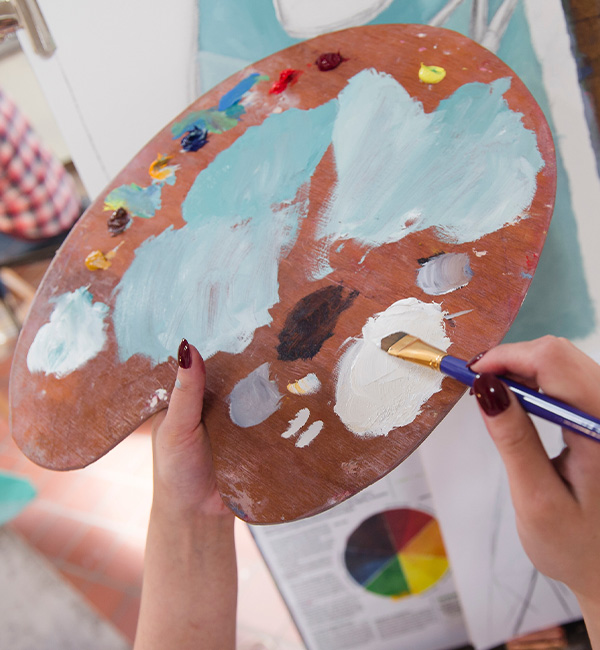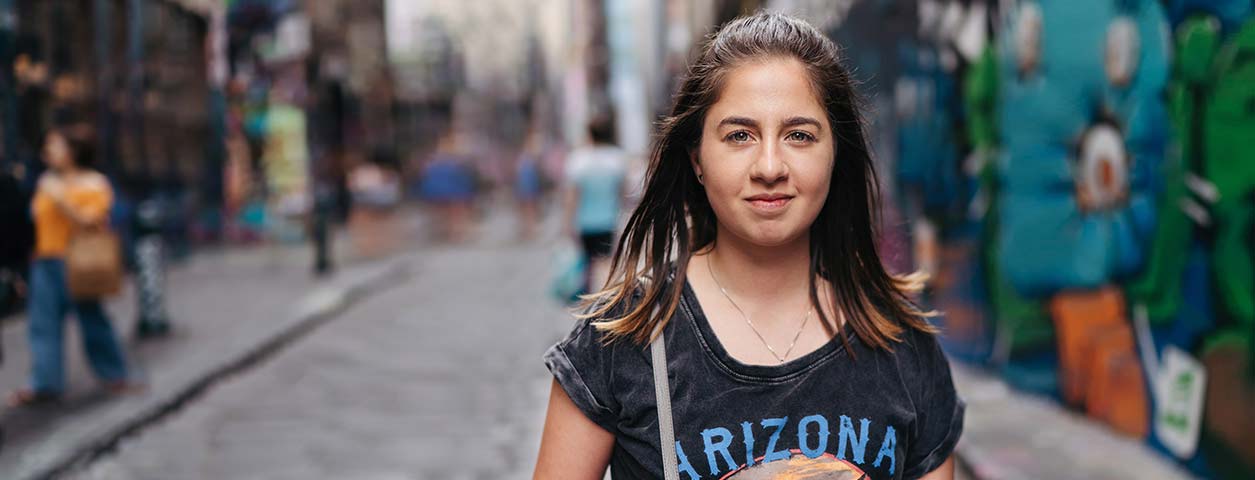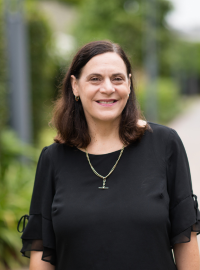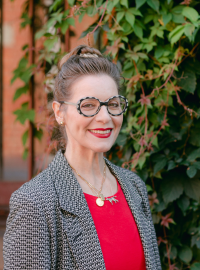Bachelor of Creative Arts
Course information for - 2024 entry
Offered at 1 locations
- Duration
- 3 years full-time or equivalent part-time
- CRICOS Code
- 084346A
- IELTS
- Overall score: 6.0. Individual score of: 6.0 in writing and speaking; 5.5 in listening and reading.
- Fees (first year)*
- $26848
Overview
A Bachelor of Creative Arts from ACU will inspire you to become a versatile and agile innovator while developing the skills and experience needed to adapt to an ever-changing creative landscape.
You don’t need an extensive portfolio to apply or undergo a gruelling audition process. Instead, be ready to immerse yourself in a range of creative arts that foster flexible and innovative thinking, be prepared to offer out-of-the-box creative solutions, dive into self-expression without limitations and get primed to thrive.
Throughout your degree you’ll have the opportunity to explore a diverse range of creative mediums and develop your creative specialisation while learning real-world skills alongside world-class academics and practicing technicians.
You will benefit from hands-on, project-based learning and exhibit your skills to the public through exhibitions, publications, and performances.
You will also have exceptional global opportunities to join our exciting overseas study experiences in locations such as New York and Rome and build international networks and cross-cultural agility.
Then in your final year, you’ll complete a major creative project in your chosen art form, whether it’s communication, creative writing, design and technologies, drama, music, graphic design, media, or visual arts.

Professional experience
You will have the option to either complete up to 50 –70 hours of Community Engagement placement or to complete the Big Ideas Social Enterprise and Innovation unit.
The Community Engagement placement gives you the opportunity to use your creativity, skills and initiative working on projects run by community groups, government, not-for-profit, social enterprise or otherwise ethically-focussed organisations.
The Big Ideas Social Enterprise asks you to work with your peers to develop a social enterprise or business concept that meets the needs of a specific area of disadvantage in the community. You’ll hear from experts already doing this work out in the world to help spark your creativity and innovative ideas and ground them in the practical knowledge you’ll need to make them reality.

Careers
Our graduates have pursued careers in:
- arts administration
- communications
- museum and galleries
- careers in theatre
- careers involving writing
- editorial careers in publishing
- public relations
- industrial design
- community arts
- community organisations
- teaching (with further study)
Course details
Course structure
To complete the Bachelor of Creative Arts, a student must complete 240 credit points (cp).
Available Major(s)
-
Design and Technologies
Consider past, present and emerging technologies and investigate why people develop and use specific technologies and what their potential impacts are on individuals, communities and the environment.
In this design and technologies major sequence you will develop skills in areas including textiles, food and industrial design using timber, metal, plastics, 3D printing and electronics and will work toward developing innovative, product design projects. You will have the opportunity to select from the following sequences: food technology, textiles and design, industrial (timber, metal, electronics, engineering and graphics and multimedia), generic design and technology.
The major is also a pathway to becoming a secondary-school technologies teacher when combined with a tertiary teaching qualification.
The Australian Government regards high-quality science, technology, engineering and mathematics (STEM) education as critically important for current and future productivity.
Drama
The major sequence in drama provides you with a comprehensive overview of theatrical literature and history and a grounding in production work. Through performances, workshops and practical classes, ACU’s drama sequence develops your skills in many areas including theatre production, stage management, direction, and acting, as well as knowledge of theatre history and repertoire. You’ll gain transferrable skills in communication and public speaking, allowing you to seek employment in the performing arts industry or use the skills developed in other professional contexts. When combined with an appropriate tertiary teaching qualification, the drama major is a pathway to becoming a secondary-school drama teacher. You do not need any previous theatre experience and there are no prerequisites for studying this sequence at ACU.
English
Through the study of a broad range of literary texts and approaches to reading them, the English major sequence familiarises you with literary traditions and contemporary literary cultures. This major sequence will reveal the varied ways in which people have lived, thought, felt and imagined, opening up new worlds of understanding. You will develop vital transferrable skills in effective reading, writing, analysis and interpretation that will equip you for a rewarding career in teaching, journalism, the media, or other professions that require articulate and culturally literate graduates.
Music
Our music major sequence develops your knowledge and skills in music language, analysis and musicianship. You’ll be supported to become a professional musician as you learn to apply the knowledge and skills required to perform, create, manipulate, interpret and critique music in safe and culturally appropriate ways, and in ways that align with the competency norms of Australia's creative industries. A music sequence does not require an audition for entry at ACU. The major is also a pathway to becoming a secondary-school music teacher when combined with a tertiary teaching qualification.
Visual Arts
The visual arts major sequence provides a mix of art and design history and theory electives and studio-based fine art. You’ll experience a range of professional practice opportunities such as entering your work in art competitions, writing publish-ready interviews, articles and art reviews and presenting you artwork in group exhibitions in the ACU gallery. You will be trained by staff who are active practitioners in their field and benefit from small class sizes in an intimate studio environment. If you’re on an education pathway, you can combine a major in the visual arts with a teaching qualification to prepare you for secondary level visual arts teaching.
Available Minor(s)
-
Communication
Students can choose to learn skills that underpin successful university study and also develop abilities that are immediately transferrable to any workplace and are highly sought after by employers. Depending on unit selection, the sequence develops hands-on skills in interpersonal, intercultural, and workplace communication, as well as providing training in oral and written communication skills. You will have the opportunity to select units that will let you work with different modes of writing including report writing, creative writing, writing for social media, feature writing and blogs, and you will be taught to speak in public, lead meetings, conduct interviews and negotiations and undertake mediation and conflict management. Students will leave the minor as confident and capable communicators. Employers value staff who possess the ‘soft skills’ that are developed within a Communications minor. Having a willingness to collaborate, being able to effectively problem solve, having critical thinking skills, possessing good interpersonal skills, and being able to adapt to change are in high demand in the workplace.
Drama
The minor sequence in drama provides you with a comprehensive overview of theatrical literature and history and a grounding in production work. Through performances, workshops and practical classes, ACU’s drama sequence develops your skills in many areas including theatre production, stage management, direction, and acting, as well as knowledge of theatre history and repertoire. You’ll gain transferrable skills in communication and public speaking, allowing you to seek employment in the performing arts industry or use the skills developed in other professional contexts. When combined with an appropriate tertiary teaching qualification, the drama major is a pathway to becoming a secondary-school drama teacher. You do not need any previous theatre experience and there are no prerequisites for studying this sequence at ACU.
English
Through the study of a broad range of literary texts and approaches to reading them, the English minor sequence familiarises you with literary traditions and contemporary literary cultures. This minor will reveal the varied ways in which people have lived, thought, felt and imagined, opening up new worlds of understanding. You will develop vital transferrable skills in effective reading, writing, analysis and interpretation that will equip you for rewarding careers in teaching, journalism, the media, and other professions that require articulate and culturally literate graduates.
Graphic Design
Graphic design is an innovative and essential component of contemporary visual culture and the built environment. Understanding the principles of effective visual communication adds competitive value to projects from all disciplines and allows you to develop a broad range of skills transferable to any workplace. The graphic design minor sequence will prepare you with authentic assessment projects designed to build experience and understanding of design processes methodology and equip you to confidently create and assess effective visual communication and develop your own design solution strategies. Graphic design units focus on the following areas: design for publication, information design, interactive and web design, typography, illustration, social media, visual storytelling and the digital image. Regardless of your technical background, you will acquire broad skills in current design software programs in a workshop-based computer lab class.
Music
The Music sequence develops skills in composition, music technology, musicology, music criticism and analysis. Students engage with the fundamentals of music language as it operates in a diverse range of styles and genres, and are taught to observe, understand and apply complex music processes drawn from the music of the past and the present. Students also engage with the cultural, social, aesthetic, historical and ethical functions of music through studies in musicology. Career outcomes that can arise from this sequence include teaching (when the major is combined with year 12 music performance or AMEB grade five and a tertiary teaching qualification), freelance composition (for film, television, video games, and commercials), music journalism and blogging, publishing, music administration, music retail, music research and work as 'embedded' creative practitioners using the skills developed through the sequence in the corporate and public sector.
Visual Arts
The visual arts minor offers a mix of art and design history and theory and studio-based fine art. You will be trained by staff who are active practitioners in their field and benefit from small class sizes in an intimate studio environment.
Course map
Graduate statement
AQF framework
Bachelor - AQF Level 7Exit Points
Students who have met the requirements of the Diploma in Creative Arts or Diploma in Liberal Arts can exit with this award.
Entry requirements
View transparency admission information
International applicants
Applicants require the equivalent of Australian Year 12 certificate and an IELTS overall score of 6.0. Individual score of 6.0 in writing and speaking, and 5.5 in listening and reading.
English language requirements
Overall score of 6.0. Individual score of 6.0 in writing and speaking, and 5.5 in listening and reading.
Adjustment factors
If you’re currently completing Year 12 you may be eligible for adjustment factors that can boost your rank and help you get into your desired course.
Adjustment factors may be applied to your TAC application if you study particular subjects, attend schools geographically close to our campuses or in certain regional areas, apply as an elite athlete or performer or meet certain other criteria.
Inherent requirement
There are essential components of a course or unit that demonstrate the capabilities, knowledge and skills to achieve the core learning outcomes of that course or unit. You will need to be able to meet these inherent requirements to complete your course.
Learn more about inherent requirements for your course and how they affect you
Pathways
Pathways into course for international applicants
If you don’t currently meet the direct entry requirements for admission to your chosen program, don’t worry. Our range of pathway programs can help you build the language proficiency, academic skills and confidence you need to succeed.
Find out more about English language programs
Further study
Diploma in Languages; and Bachelor of Arts (Honours). Or our education courses; Master of Teaching (Early Childhood and Primary); Master of Teaching (Primary); Master of Teaching (Secondary).
Fees
Course costs
- Unit fee: $3356
- Average first year fee: $26848
- Estimate total cost: $80544
The Tuition fees quoted above are for commencing students in the current year who undertake a normal full-time load. The Unit Fee is based on a 10cp unit. Fees are reviewed annually.
Tuition fees for continuing students may increase by up to 3 percent each year for the minimum duration of the course as provided on your electronic Confirmation of Enrolment (eCOE). Students who continue to study beyond the minimum duration will have the relevant annual commencing rate applied to their fees for subsequent study periods.
Payment options
You should be able to concentrate on getting good marks instead of worrying about how you’ll pay your fees. We have a number of options that can help you ease the financial burden, including government assistance, scholarships and income support.
Scholarships
You could be eligible for one of the hundreds of scholarships we award each year to help students from across the university with the cost of studying, accommodation or overseas study opportunities. Some of our scholarships are awarded on the basis of merit, but these aren’t just for the academically gifted; ACU also recognises excellence in community engagement and leadership. We also offer a range of scholarships for those who may be struggling financially or who have faced other barriers to accessing education.
How to apply
Domestic applicants
Staff Profile
Dr Delyse Ryan
Deputy Head of School of Arts QLD (Creative Arts), National School of Arts and Humanities
Dr Delyse Ryan is the Deputy Head of the School of Arts (Creative Arts) and course coordinator for the Bachelor of Arts in Queensland. She has lectured in Drama and English at ACU since 1995 and has directed over 130 student theatre performances. Interested in developing new ways of performing classic texts for contemporary audiences, Dr Ryan's PhD study focused on Brisbane’s theatre history while her most recent research interests include theatre history and the teaching of drama within a higher education context. She has received an ACU Excellence in Teaching Award and an ACU Citation for her teaching. Delyse regularly takes performances into schools and childcare centres as a part of her community engagement. She has developed significant relationships with schools from low-socioeconomic areas and this work is designed to be presented to children who might not otherwise have an opportunity to participate in the arts.
Assoc. Prof. Catherine Bell
Lecturer in Visual Arts and Gallery Director, School of Arts and Humanities
Associate Professor Catherine Bell is a lecturer in visual art in the Bachelor of Visual Arts and Design degree in the School of Arts (VIC) and Gallery Director at the Australian Catholic University, Melbourne. A multi-disciplinary artist and curator, Assoc. Prof. Bell’s creative-led research is focused on the role of the artist in the archive and healthcare setting, neurodiverse/neurotypical inclusive practice, art on the margins, socially engaged, participatory and relational approaches to art practices, redefining and repositioning the female in contemporary society, care ethics in collaborative practice and challenging taboos surrounding death and dying.
Have a question?
We're available 9am–5pm AEDT,
Monday to Friday
If you’ve got a question, our AskACU team has you covered. You can search FAQs, text us, email, live chat, call – whatever works for you.



